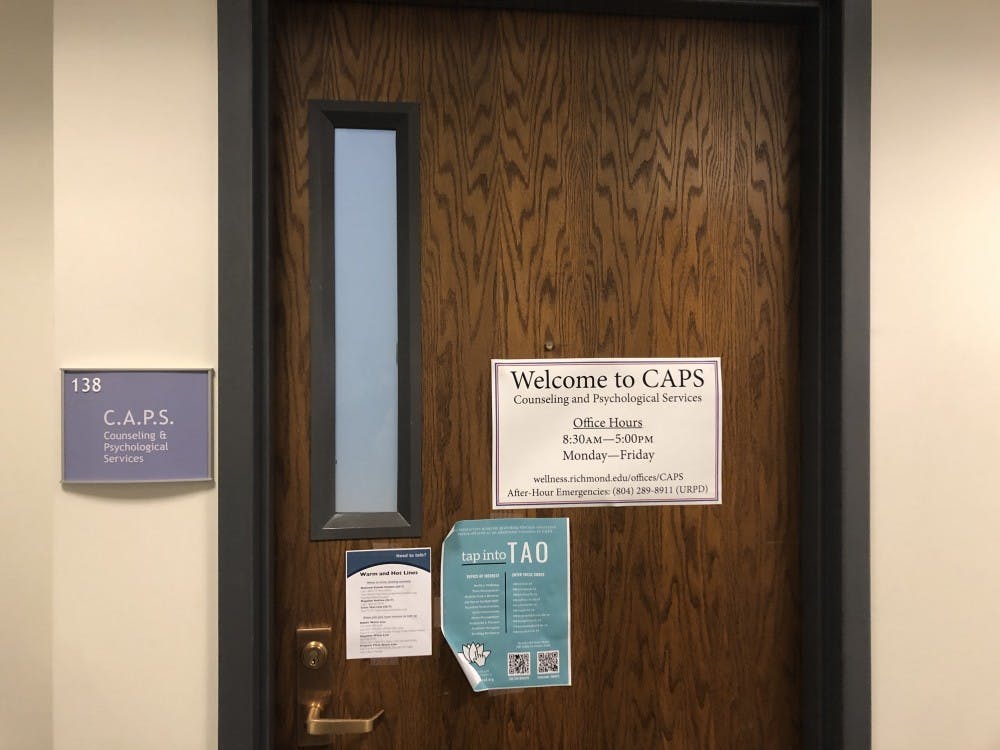Editor's Note: This article is the first in a series exploring mental health and its resources on University of Richmond's campus. The series will continue to be published throughout the fall semester. Click here to read previous articles.
The University of Richmond’s Counseling and Psychological Services implemented a new appointment scheduling policy in order to better accommodate the rising number of students seeking mental health-related help.
Students must first sign up for a brief consultation with a CAPS counselor for them to determine the next step. Counselors aim to judge how much specific symptoms affect a student’s general well-being and ability to function on a day-to-day basis when determining how to proceed, CAPS staff counselor Milo Wilson said. Wilson has personally conducted approximately 15% of this semester’s brief consultations.
“It’s really about trying to figure out how significant and how severe someone’s problems are and [to match] them with the least intensive intervention possible,” Wilson said.
If CAPS identifies a student as eligible for individual counseling, the student must complete two Therapy Assistance Online modules or attend two Well-Being Seminars (or one of each) before individual counseling can begin. Then, the student can begin one-on-one appointments with one of the 10 counselors on staff.
Previously, students were placed on a waitlist for individual counseling on a first-come, first-serve basis. Since the start of the current semester, CAPS has yet to place a student on the waitlist for individual sessions, CAPS Director Peter LeViness said.
By Sept. 11 of last year, CAPS had 29 students on the waitlist. In mid-November, the waitlist was at 114 students, and LeViness said it had peaked at 119 by the end of that month. CAPS was unable to meet with approximately 50-60 of the wait-listed students before the end of the fall semester.
“In the current mental health world, demand is outpacing supply,” LeViness said.
Over the last 17 years, student demand for CAPS services has almost tripled on the UR campus, which made the previous system untenable, LeViness said.
CAPS maintains open time slots for students in crisis, which is defined as “recent suicidal thoughts, recent assault, severe emotional distress, etc.” on the CAPS website. These students can bypass the appointment process to receive help as soon as possible.
A sophomore student speaking on the condition of anonymity said she had been seen this semester for a one-on-one appointment the same day she registered as in crisis. The student described her scheduling process as easy, and confirmed that she had been able to bypass the steps that students not in crisis would have had to take to begin one-on-one appointments of their own.
Other students could potentially take weeks to complete the prerequisite steps to one-on-one counseling. CAPS offers hour-long Well-Being Seminars focused on emotions, relationships or stress five times per week. LeViness estimated that the Well-Being Seminars had averaged about five students per session thus far.
Enjoy what you're reading?
Signup for our newsletter
Therapy Assistance Online modules are available online for UR students and cover a range of wellness topics meant to promote self-help. According to the CAPS website, “[Therapy Assistance Online] Self Help assists you with managing your own emotional well-being without the help of a therapist.”
CAPS has aimed to develop additional new programs that are preventative rather than reactive.
“How can we send good messages about taking care of ourselves and one another?” LeViness asked. “Wouldn’t it be awesome if students didn’t need us?”
Still, he stressed that because demand for counseling had increased across the country — specifically on college campuses — CAPS would be available in some form when and if students needed help.
Contact sports writer Noah Jacobs at noah.jacobs@richmond.edu.
Support independent student media
You can make a tax-deductible donation by clicking the button below, which takes you to our secure PayPal account. The page is set up to receive contributions in whatever amount you designate. We look forward to using the money we raise to further our mission of providing honest and accurate information to students, faculty, staff, alumni and others in the general public.
Donate Now



